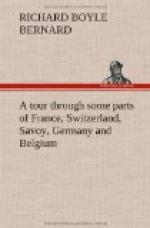I shall here insert an epigram composed in 1602, by a Prince of Hesse, who, at his departure, presented the city with 10,000 crowns.
Quisquis amat vitam, sobriam,
castamque tueri,
Perpetuo esto
illi casta Geneva domus:
Quisquis amat vitani hanc
bene vivere, virere et illam,
Illi iterum fuerit
casta Geneva domus.
Illic iuvenies, quidquid,
conducit utrique:
Relligio hic sana
est, aura, ager, atque lucus.
Amongst the various objects which are pointed out as deserving the attention of a stranger, is the house in which the celebrated J.J. Rousseau was born, in the year 1712. The circumstance is recorded by an inscription over the door. His father was a watchmaker, and his house was small and obscurely situated.
Rousseau was perhaps the most eloquent and fascinating of all the sceptical writers of the last century; and probably the only one amongst them who established a system of his own, if indeed his eccentricities can be so called. His character exhibited a strange mixture of pride, which made him perpetually anxious to be of public notoriety, and of an unsociable temper, which often made him retire in disgust with the world, and treat (without any rational cause, that has been assigned) those who were most his friends, as if he considered them to be his bitterest enemies. He was far more jealous of the reputation obtained by his contemporaries, than delighted with the approbation he personally received. Considered as a philosopher, he was paradoxical; as a moralist, dangerous and licentious; as a parent, unnaturally abandoning his offspring; as a friend, suspicious and ungrateful. As pride was the ruling passion of Rousseau, so was vanity beyond dispute the grand characteristic of Voltaire, (the proximity of Fernay may excuse my here comparing him with Rousseau,) and this passion induced him to pervert transcendent talents to the most pernicious and fatal purposes.
The hostility of Voltaire to the Christian dispensation has been compared to the enmity rather of a rival than of a philosopher. He is thought to have wished its overthrow, not so much because he entertained any solid objections to its sublime theories, or had real doubts as to the miracles by which it is attested; as because his vanity led him to think, that if he once could persuade men to the abolition of Christianity, he might himself become the founder of a new system of moral indulgence. The Abbe Raynal, in 1791; already repented of the philosophic principles, which he had so sedulously inculcated, and expressed his conviction, that the consequence of the theories then so finely fancied, would be a general pillage, for that their authors wanted experience, to reduce their speculations to a practical system. The Abbe was right in this last expectation, and from the French Revolution,




